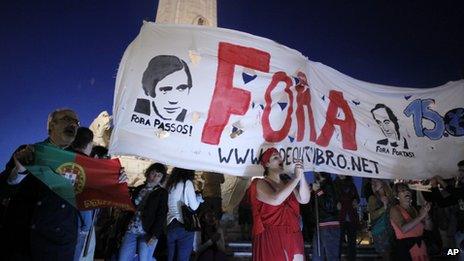Eurozone crisis: Why Portugal matters
- Published
- comments

Lisbon: Tough austerity measures have fuelled anti-government protests
The political crisis in Portugal sends a signal that the eurozone crisis is not over. The interest rate on Portugal's ten-year bonds edged above 8% today, a reminder of conditions when the crisis was at its most intense.
The government in Lisbon has been zealous in following the Brussels/Berlin script by cutting spending and implementing reforms. Portugal has applied some of the fiercest tax rises and budget cuts. In Brussels it was feted as an example of a country doing everything asked of it
It appears, however, that the austerity drive has reached its limits. Even within the government ministers are having doubts. The recession has shown no sign of ending. Unemployment is at 17.6%. There are 932,000 people without jobs. Thousands of graduates are leaving the country. Last week Portugal endured another general strike.
Portugal has already been granted more time to reach the target for cutting its deficit. Even so the IMF has said its debt levels remain "very fragile". The level of concern could be judged by statements from the European Commission today. It called on Portugal to clarify its situation "as soon as possible". The President of the Commission, Jose Manuel Barroso, warned that the "financial credibility built up by Portugal could be jeopardised by the current political instability. If this happens it would be especially damaging for the Portuguese people..."
The head of the Eurogroup (the eurozone finance ministers), Jeroen Dijsselbloem, said "the situation is worrying. So I'm calling on Portugal to take responsibility."
Germany weighed in, saying it was "confident" Portugal would stick to the reforms. Politicians in Portugal are under enormous pressure to stick with the programme.
Another bailout?
So what is to be done? Portugal will struggle to find political consensus behind continuing with the reforms and cuts. The government might try and persuade Brussels to ease again the terms of its 78bn-euro (£66bn; $101bn) bailout, which was agreed in 2011. That will not be easy.
The prime minister has already warned the Portuguese people to prepare for new sacrifices, to avoid a second bailout. The German Chancellor Angela Merkel, facing an election, may be very reluctant to contemplate a second bailout. It would raise, once again, doubts about the whole strategy.
What this latest crisis underlines is just how difficult it will be for countries like Portugal to exit their bailout programme and regain access to the markets.
It is not, however, just Portugal which remains in crisis. Greece is once again in trouble. The ruling coalition is fragile and the country has only a few days to demonstrate how it can meet the terms of its EU/IMF bailout. The privatisation programme, which was central to it raising funds, is faltering. New problems are emerging in the accounts of the state-run health insurer. The IMF is signalling its alarm. Greece will have to show how it can meet its targets or the IMF may withdraw from the rescue programme. That, in itself, would deepen the crisis.
There are some hopeful signs. Activity in the manufacturing and service sector in much of the eurozone seems to be improving, but very slowly and, all the time, the patience of voters in many of these countries is being tested.
- Published3 July 2013
